- Home
- Mordecai Richler
Barney's Version
Barney's Version Read online
Winner of the Giller Prize Winner of the Commonwealth Writers’ Prize for Best Book Winner of the Stephen Leacock Award for Humour
“Richler’s greatest achievement. … Ebullient, manic, over the top.”
—Los Angeles Times
“Barney’s Version is a personal paean that delights in skewering and roasting the self-righteous advocates of postmodern moral relativism. … Delivered as a fin-de-siècle preoration, Barney’s Version is embroidered with the savage mischief and gleeful scorn of Waugh and the downward spiralling grotesquerie of Bellow’s self-destructive anti-heroes.”
—Books in Canada
“Richler has never been in finer form. Hilarous and heart wrenching at the same time. … [Barney’s Version is] fast paced and beautifully written.”
—Ottawa Sun
“There’s every reason to love Richler and his new novel. It’s a satiric, laugh-out-loud book. It’s filled with good jokes and delicious observations. … There is also tremendous sympathy for the failures and ageing of the flesh, and the one great love affair that shapes Barney’s life. … Barney’s Version deserves more than one prize for its technical ingenuity and slyness of style.”
—The Financial Post
“A book of great humanity and humor — and nastiness. … A funny, wonderful novel which I would be very happy to see the winner [of the Giller Prize].”
—Toronto Sun
“All hail to Barney, … and to Richler too, whose funniest book in years may also be his most poignant.”
—NOW
“Funny, caustic and colourful. … An intimate and … moving exploration of the elusiveness of a moral centre in a man’s life. … [An] unfailingly entertaining novel.”
—The Windsor Star
“A feast of nonstop storytelling, and arguably [Richler’s] funniest book yet.”
—Maclean’s
“[A] triumph. … At once hilarious, poignant, satiric and elegiac. … Barney’s 30-year marriage to Miriam, their mutual love, and the two sons and one daughter they produce … are the novel’s heart and soul. … They are treated with the utter persuasiveness — the sympathy, the irony, the unique blend of comedy and tragedy — that is Richler’s great strength and that characterizes the book in its entirety. Barney’s Version has an embarrassment of riches, material enough to furnish lesser writers with several novels, yet woven here into a wantonly generous, seamless whole.”
—The Globe and Mail
VINTAGE CANADA EDITION, 2010
Copyright © 1997 Mordecai Richler
All rights reserved under International and Pan-American Copyright Conventions. No part of this book may be reproduced in any form or by any electronic or mechanical means, including information storage and retrieval systems, without permission in writing from the publisher, except by a reviewer, who may quote brief passages in a review.
Published in Canada by Vintage Canada, a division of Random House of Canada Limited, Toronto, in 2010. Originally published in hardcover in Canada by Alfred A. Knopf Canada, a division of Random House of Canada Limited, in 1997. Distributed by Random House of Canada Limited.
Vintage Canada with colophon is a registered trademark.
www.randomhouse.ca
Library and Archives Canada Cataloguing in Publication
Richler, Mordecai, 1931–2001
Barney’s version / Mordecai Richler.
eISBN: 978-0-307-36738-9
I. Title.
PS8535.I38B36 2010 C813′.54 C2010-905166-1
The “Romeo y Julieta” trademark and design are reproduced and adapted by kind permission of Havana House Cigar and Tobacco Merchants Ltd., Toronto, the registered owner of the trademark in Canada.
“In Memory of W.B. Yeats” and “Lay your sleeping head, my love” from W.H. Auden: Collected Poems by W.H. Auden, edited by Edward Mendelson. Copyright © 1940 and renewed 1968 by W.H. Auden. Reprinted by permission of Random House, Inc., and Faber and Faber Limited.
Extract from In the Fifties by Peter Vansittart. Copyright © 1995 by Peter Vansittart. Reprinted by permission of Sheil Land Associates Ltd., and John Murray (Publishers) Ltd.
Mairzy Doats by Al Hoffman, Milton Drake and Jerry Livingston. Copyright © 1943 (Renewed) by Al Hoffman Songs, Inc., Drake Activities and Hallmark Music Co. International Copyright Secured. All Rights reserved. Reprinted by Permission.
“I think continually of those who were truly great” by Stephen Spender. Copyright © 1934 and renewed 1962 by Stephen Spender. Reprinted by permission of Random House, Inc.
First four lines from “Howl” from Collected Poems 1947–1980 by Allen Ginsberg (Viking, 1985). Copyright © 1955 and 1985 by Allen Ginsberg. Reprinted by permission of Frederick Warne & Co., and HarperCollins Publishers, Inc.
v3.1
For Florence,
and in memory of four absent friends:
Jack Clayton, Ted Allan, Tony Godwin,
and Ian Mayer
CONTENTS
Cover
Title Page
Copyright
Dedication
Other Books by This Author
1 Clara 1950–1952
2 The Second Mrs. Panofsky 1958–1960
3 Miriam 1960–
Afterword: by Michael Panofsky
A Note about the Author
ALSO BY MORDECAI RICHLER
NOVELS
The Acrobats
Son of a Smaller Hero
A Choice of Enemies
The Apprenticeship of Duddy Kravitz
The Incomparable Atuk (Stick Your Neck Out)
Cocksure
St. Urbain’s Horseman
Joshua Then and Now
Solomon Gursky Was Here
STORIES
The Street
ESSAYS
Hunting Tigers Under Glass
Shovelling Trouble
Notes on an Endangered Species and Others
The Great Comic Book Heroes and Other Essays
Home Sweet Home: My Canadian Album
Broadsides
Belling the Cat
Dispatches from the Sporting Life
CHILDREN’S BOOKS
Jacob Two-Two Meets the Hooded Fang
Jacob Two-Two and the Dinosaur
Jacob Two-Two’s First Spy Case
ANTHOLOGIES
The Best of Modern Humour
Writers on World War II
NON-FICTION
Oh Canada! Oh Quebec!
This Year in Jerusalem
On Snooker
1
Clara
1950–1952
1
TERRY’S THE SPUR. The splinter under my fingernail. To come clean, I’m starting on this shambles that is the true story of my wasted life (violating a solemn pledge, scribbling a first book at my advanced age), as a riposte to the scurrilous charges Terry McIver has made in his forthcoming autobiography: about me, my three wives, a.k.a. Barney Panofsky’s troika, the nature of my friendship with Boogie, and, of course, the scandal I will carry to my grave like a humpback. Terry’s sound of two hands clapping, Of Time and Fevers, will shortly be launched by The Group (sorry, the group), a government-subsidized small press, rooted in Toronto, that also publishes a monthly journal, the good earth, printed on recycled paper, you bet your life.
Terry McIver and I, both Montrealers born and bred, were in Paris together in the early fifties. Poor Terry was no more than tolerated by my bunch, a pride of impecunious, horny young writers awash in rejection slips, yet ostensibly confident that everything was possible — fame, adoring bimbos, and fortune lying in wait around the corner, just like that legendary Wrigley’s shill of my boyhood. The shill, according to report, would surprise you on the street to rew
ard you with a crisp new dollar bill, provided you had a Wrigley’s chewing-gum wrapper in your pocket. Mr. Wrigley’s big giver never caught up with me. But fame did find several of my bunch: the driven Leo Bishinsky; Cedric Richardson, albeit under another name; and, of course, Clara. Clara, who now enjoys posthumous fame as a feminist icon, beaten on the anvil of male-chauvinist insentience. My anvil, so they say.
I was an anomaly. No, an anomie. A natural-born entrepreneur. I hadn’t won awards at McGill, like Terry, or been to Harvard or Columbia, like some of the others. I had barely squeezed through high school, having invested more time at the tables of the Mount Royal Billiards Academy than in classes, playing snooker with Duddy Kravitz. Couldn’t write. Didn’t paint. Had no artistic pretensions whatsoever, unless you count my fantasy of becoming a music-hall song-and-dance man, tipping my straw boater to the good folks in the balcony as I fluttered off stage in my taps, yielding to Peaches, Ann Corio,1 Lili St. Cyr, or some other exotic dancer, who would bring her act to a drum-throbbing climax with a thrilling flash of bare tit, in days long before lap-dancers had become the norm in Montreal.
I was a voracious reader, but you would be mistaken if you took that as evidence of my quality. Or sensibility. At bottom, I am obliged to acknowledge, with a nod to Clara, the baseness of my soul. My ugly competitive nature. What got me started was not Tolstoy’s The Death of Ivan Ilyich, or Conrad’s The Secret Agent, but the old Liberty magazine, which prefaced each of its articles with a headnote saying how long it would take to read it: say, five minutes and thirty-five seconds. Setting my Mickey Mouse wristwatch on our kitchen table with the checkered oilcloth, I would zip through the piece in question in, say, four minutes and three seconds, and consider myself an intellectual. From Liberty, I graduated to a paperback John Marquand “Mr. Moto” novel, selling for twenty-five cents at the time in Jack and Moe’s Barbershop, corner of Park Avenue and Laurier in the heart of Montreal’s old working-class Jewish quarter, where I was raised. A neighbourhood that had elected the only Communist (Fred Rose) ever to serve as a member of Parliament, produced a couple of decent club fighters (Louis Alter, Maxie Berger), the obligatory number of doctors and dentists, a celebrated gambler–cum–casino owner, more cutthroat lawyers than needed, sundry school teachers and shmata millionaires, a few rabbis, and at least one suspected murderer.
Me.
I remember snow banks five feet high, winding outside staircases that had to be shovelled in the sub-zero cold, and, in days long before snow tires, the rattle of passing cars and trucks, their wheels encased in chains. Sheets frozen rock-hard on backyard clotheslines. In my bedroom, where the radiator sizzled and knocked through the night, I eventually stumbled on Hemingway, Fitzgerald, Joyce, Gertie and Alice, as well as our own Morley Callaghan. I came of age envying their expatriate adventures and, as a consequence, made a serious decision in 1950.
Ah, 1950. That was the last year Bill Durnan, five times winner of the Vézina Trophy, best goalie in the National Hockey League, would mind the nets for my beloved Montreal Canadiens. In 1950, nos glorieux could already deploy a formidable defence corps, its mainstay young Doug Harvey. The Punch Line was then only two thirds intact: in the absence of Hector “Toe” Blake, who retired in 1948, Maurice “The Rocket” Richard and Elmer Lach were skating on a line with Floyd “Busher” Curry. They finished second to bloody Detroit in the regular season and, to their everlasting shame, went down four games to one to the New York Rangers in the Stanley Cup semifinals. At least The Rocket enjoyed a decent year, finishing the regular season second in the individual scoring race with forty-three goals and twenty-two assists.2
Anyway, in 1950, at the age of twenty-two, I left the chorus girl I was living with in a basement flat on Tupper Street. I withdrew my modest stash from the City and District Savings Bank, money I had earned as a waiter at the old Normandy Roof (a job arranged by my father, Detective-Inspector Izzy Panofsky), and booked passage to Europe on the Queen Elizabeth,3 sailing out of New York. In my innocence, I was determined to seek out and be enriched by the friendship of what I then thought of as the pure of heart, artists, “the unacknowledged legislators of the world.” And those, those were the days when you could smooch with college girls with impunity. One, Two, Cha-Cha-Cha. “If I Knew You Were Coming I’d’ve Baked a Cake.” Moonlit nights on deck, nice girls wore crinolines, cinch belts, ankle bracelets, and two-tone saddle shoes, and you could count on them not to sue you for sexual harassment forty years later, their suppressed memories of date-rape retrieved by lady psychoanalysts who shaved.
Not fame, but fortune eventually found me. That fortune, such as it is, had humble roots. To begin with, I was sponsored by a survivor of Auschwitz, Yossel Pinsky, who changed dollars for us at black-market rates in a curtained booth in a photography shop on the rue des Rosiers. One evening Yossel sat down at my table in The Old Navy, ordered a café filtre, dropped seven sugar cubes into his cup, and said, “I need somebody with a valid Canadian passport.”
“To do what?”
“Make money. What else is left?” he asked, taking out a Swiss Army knife and beginning to clean his remaining fingernails. “But we should get to know each other a little better first. Have you eaten yet?”
“No.”
“So let’s go for dinner. Hey, I won’t bite. Come, boychick.”
And that’s how, only a year later, Yossel serving as my guide, I became an exporter of French cheeses to an increasingly flush postwar Canada. Back home, Yossel arranged for me to run an agency for Ves-pas, those Italian motorized scooters that were once such a hot item. Over the years I also dealt profitably, with Yossel as my partner, in olive oil, just like the young Meyer Lansky; bolts of cloth spun on the islands of Lewis and Harris; scrap metal, bought and sold without my ever having seen any of it; antiquated DC-3S, some of them still being flown North of Sixty; and, after Yossel had moved to Israel, one step ahead of the gendarmes, ancient Egyptian artifacts, stolen from minor tombs in the Valley of the Kings. But I have my principles. I have never handled arms, drugs, or health foods.
Finally I became a sinner. In the late sixties, I began to produce Canadian-financed films that were never exhibited anywhere for more than an embarrassing week, but which eventually earned me, and on occasion my backers, hundreds of thousands of dollars through a tax loophole since closed. Then I started to churn out Canadian-content TV series sufficiently shlocky to be syndicated in the U.S. and, in the case of our boffo McIver of the RCMP series, which is big on bonking scenes in canoes and igloos, in the U.K., and other countries as well.
When it was required of me, I could rumba as a latter-day patriot, sheltering in the Great Cham’s last refuge of the scoundrel. Whenever a government minister, a free-marketeer responding to American pressure, threatened to dump the law that insisted on (and bankrolled to a yummy degree) so much Canadian-manufactured pollution on our airwaves, I did a quick change in the hypocrite’s phone booth, slipping into my Captain Canada mode, and appeared before the committee. “We are defining Canada to Canadians,” I told them. “We are this country’s memory, its soul, its hypostasis, the last defence against our being overwhelmed by the egregious cultural imperialists to the south of us.”
I digress.
Back in our expatriate days, we roistering provincials, slap-happy to be in Paris, drunk on the beauty of our surroundings, were fearful of retiring to our Left Bank hotel rooms lest we wake up back home, retrieved by parents who would remind us of how much they had invested in our educations, and how it was time for us to put our shoulders to the wheel. In my case, no airmail letter from my father was complete without its built-in stinger:
“Yankel Schneider, remember him, he had a stammer? So what? He’s become a chartered accountant and drives a Buick now.”
Our loosy-goosy band included a couple of painters, so to speak, both of them New Yorkers. There was the loopy Clara and the scheming Leo Bishinsky, who managed his artistic rise better than Wellington did — you know, that bat
tle in a town in Belgium.4 He left a ball to go to it. Or interrupted a game of bowls. No, that was Drake.
A garage in Montparnasse served as Leo’s atelier, and there he laboured on his huge triptychs, mixing his paints in buckets and applying them with a kitchen mop. On occasion he would swish his mop around, stand back ten feet, and let fly. Once, when I was there, the two of us sharing a toke, he thrust his mop at me. “Have a go,” he said.
“Really?”
“Why not?”
Soon enough, I figured, Leo would get a shave and a haircut and join an advertising agency in New York.
I was dead wrong.
Go know that forty years later Leo’s atrocities would be hanging in the Tate, the Guggenheim, MOMA, and The National Gallery in Washington, and that others would be sold for millions to junk-bond mavens and arbitrage gurus who were often outbid by Japanese collectors. Go anticipate that Leo’s battered Renault deux-chevaux5 would one day be succeeded, in a ten-car garage in Amagansett, by a Rolls-Royce Silver Cloud, a vintage Morgan, a Ferrari 250 berlinetta, and an Alfa Romeo, among other toys. Or that to mention his name today, in passing, I could be accused of name-dropping. Leo has appeared on the cover of Vanity Fair in Mephistophelian guise, replete with horns, magenta cape and tails, painting magic symbols on the nude body of a flavour-of-the-month starlet.
In the old days you could always tell who Leo was screwing, because, tout court, a white-bread-and-cashmere-twin-set young woman out of Nebraska, working for the Marshall Plan, would turn up at La Coupole and think nothing of picking her nose at the table. But today renowned fashion models flock to Leo’s Long Island mansion, vying with one another to proffer pubic hairs that can be worked into his paintings along with bits of beach glass, bluefish skeletons, salami butts, and toenail clippings.
Back in 1951 my gang of neophyte artists flaunted their liberation from what they, de haut en bas, denigrated as the rat race, but the sour truth is, with the shining exception of Bernard “Boogie” Moscovitch, they were all contenders. Each one as fiercely competitive as any Organization Man or Man in the Gray Flannel Suit, if any of you out there are old enough to remember those long-forgotten best-sellers, modish for a season. Like Colin Wilson. Or the Hula Hoop. And they were driven by the need to succeed as much as any St. Urbain Street urchin back home who had bet his bundle on a new autumn line of après-ski wear. Fiction is what most of them were peddling. Making it new, as Ezra Pound had ordained before he was certified insane. Mind you, they didn’t have to cart samples round to department store buyers, floating on “a smile and a shoeshine,” as Clifford Odets6 once put it. Instead, they shipped their merchandise off to magazine and book editors, enclosing a stamped, self-addressed envelope. Except for Boogie, my anointed one.

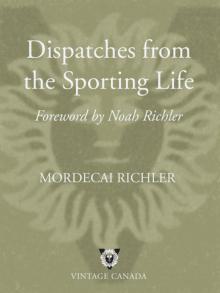 Dispatches From the Sporting Life
Dispatches From the Sporting Life The Acrobats
The Acrobats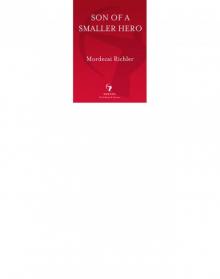 Son of a Smaller Hero
Son of a Smaller Hero Jacob Two-Two-'S First Spy Case
Jacob Two-Two-'S First Spy Case Jacob Two-Two Meets the Hooded Fang
Jacob Two-Two Meets the Hooded Fang Jacob Two-Two and the Dinosaur
Jacob Two-Two and the Dinosaur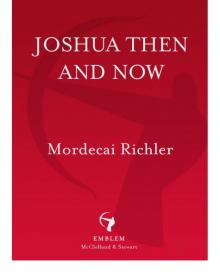 Joshua Then and Now
Joshua Then and Now Solomon Gursky Was Here
Solomon Gursky Was Here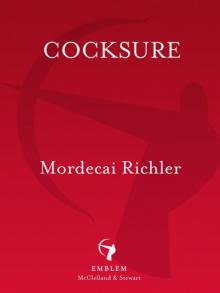 Cocksure
Cocksure The Street
The Street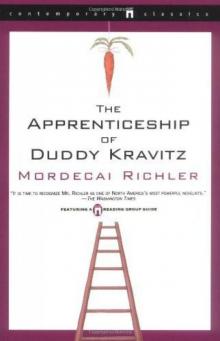 The Apprenticeship of Duddy Kravitz
The Apprenticeship of Duddy Kravitz A Choice of Enemies
A Choice of Enemies Barney's Version (Movie Tie-In Edition)
Barney's Version (Movie Tie-In Edition)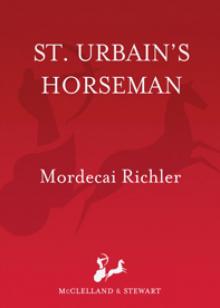 St. Urbain's Horseman
St. Urbain's Horseman The Incomparable Atuk
The Incomparable Atuk Barney's Version
Barney's Version